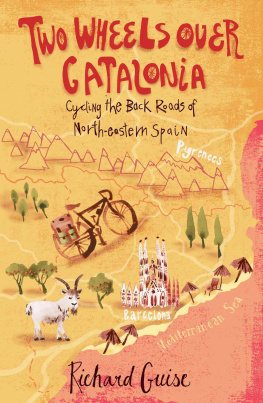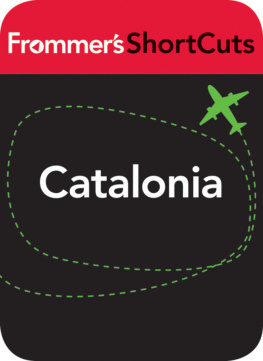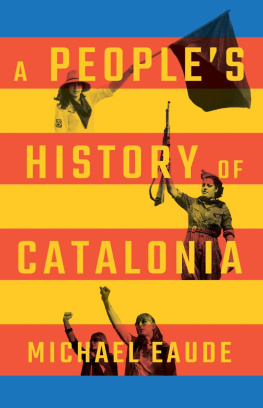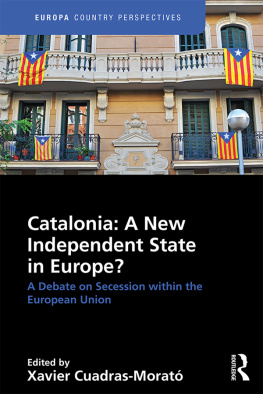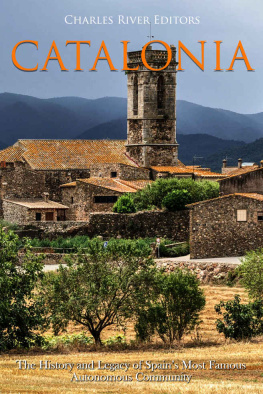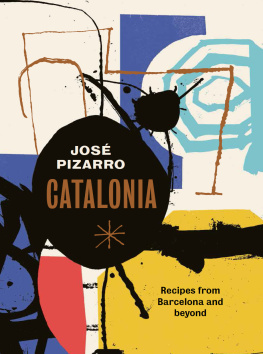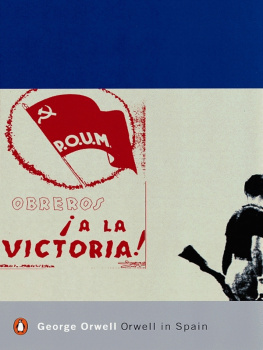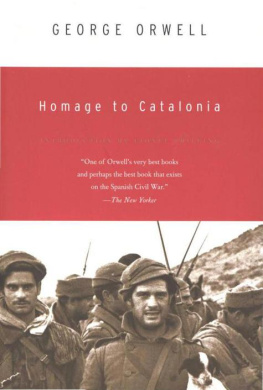Eaude - Catalonia: A Cultural History
Here you can read online Eaude - Catalonia: A Cultural History full text of the book (entire story) in english for free. Download pdf and epub, get meaning, cover and reviews about this ebook. City: Oxford, year: 2008, publisher: Oxford University Press, genre: Detective and thriller. Description of the work, (preface) as well as reviews are available. Best literature library LitArk.com created for fans of good reading and offers a wide selection of genres:
Romance novel
Science fiction
Adventure
Detective
Science
History
Home and family
Prose
Art
Politics
Computer
Non-fiction
Religion
Business
Children
Humor
Choose a favorite category and find really read worthwhile books. Enjoy immersion in the world of imagination, feel the emotions of the characters or learn something new for yourself, make an fascinating discovery.

- Book:Catalonia: A Cultural History
- Author:
- Publisher:Oxford University Press
- Genre:
- Year:2008
- City:Oxford
- Rating:3 / 5
- Favourites:Add to favourites
- Your mark:
- 60
- 1
- 2
- 3
- 4
- 5
Catalonia: A Cultural History: summary, description and annotation
We offer to read an annotation, description, summary or preface (depends on what the author of the book "Catalonia: A Cultural History" wrote himself). If you haven't found the necessary information about the book — write in the comments, we will try to find it.
Eaude: author's other books
Who wrote Catalonia: A Cultural History? Find out the surname, the name of the author of the book and a list of all author's works by series.
Catalonia: A Cultural History — read online for free the complete book (whole text) full work
Below is the text of the book, divided by pages. System saving the place of the last page read, allows you to conveniently read the book "Catalonia: A Cultural History" online for free, without having to search again every time where you left off. Put a bookmark, and you can go to the page where you finished reading at any time.
Font size:
Interval:
Bookmark:
CATALONIA
Landscapes of the Imagination
The Alps by Andrew Beattie
Provence by Martin Garrett
The Thames by Mick Sinclair
Flanders by Andr de Vries
Catalonia by Michael Eaude
The Basque Country by Paddy Woodworth

Oxford University Press, Inc., publishes works that further
Oxford Universitys objective of excellence
in research, scholarship, and education.
Oxford New York
Auckland Cape Town Dar es Salaam Hong Kong Karachi
Kuala Lumpur Madrid Melbourne Mexico City Nairobi
New Delhi Shanghai Taipei Toronto
With offices in
Argentina Austria Brazil Chile Czech Republic France Greece
Guatemala Hungary Italy Japan Poland Portugal Singapore
South Korea Switzerland Thailand Turkey Ukraine Vietnam
Copyright 2008 by Michael Eaude
Published by Oxford University Press, Inc.
198 Madison Avenue, New York, New York 10016
www.oup.com
Oxford is a registered trademark of Oxford University Press
Co-published in Great Britain by Signal Books
All rights reserved. No part of this publication may be reproduced,
stored in a retrieval system, or transmitted, in any form or by any means,
electronic, mechanical, photocopying, recording, or otherwise,
without the prior permission of Oxford University Press.
Library of Congress Cataloging-in-Publication Data
Eaude, Michael.
Catalonia : a cultural history/Michael Eaude.
p. cm. (Landscapes of the imagination)
Includes bibliographical references.
ISBN 978-0-19-532797-7
I. Catalonia (Spain)Civilization I. Title.
DP302.C616E38 2007
946.7dc22 2007005776
9 8 7 6 5 4 3 2 1
Printed in the United States of America
on acid-free paper
I first became aware of Catalonia as a country that had a specific identity apart from Spain on 9 April 1973. The moment is fixed in my mind. I had gone to see Antoni Turull, Lecturer in the Spanish Department at Bristol University, with a view to attending his course on Cuban literature. This was our first meeting. Antoni, white hair straggling to his shoulders though he was only forty, greeted me with what I came to know as his characteristic warm extravagance: Our great Picasso is dead. That day I was made aware of three things: that Catalonia was a nation; that Catalans could legitimately claim Picasso as a wonderful adopted son; and that Catalan was a rich language and taught in some British universities, such as Bristol. Antoni was one of those pioneer teachers. He continued trying to educate my ignorance on our occasional meetings until his early death in January 1990.
I am grateful, too, to my other early Catalan friends, Rosa Blanch and Toni Tulla, whose mother and then sister, Assumpci, ran the beautiful, old-fashioned chess bar, the Oro negro, in Barcelonas Carrer Aribau. Rosa and Toni kindly had me to stay in Barcelona on several occasions, including stressful weeks towards the very end of the dictatorship. Then activists in what was quite the best of the Catalan radical groups, the LCR, la Lliga, they explained Catalan politics to me and introduced me to embotits and the beautiful music of Llus Llach. The sound of 1975 and the death of Franco are captured for me in Llachs intimate and soaring voice singing that allusive political anthem, Voyage to Ithaca: Ms lluny, sempre molt ms lluny ... Further, always much further on...
I would like to thank, too, the following who generously helped me on specific questions concerned with this book: Andy Durgan, Jude Egan, David C. Hall, Stephen Hayward, Vicky Hayward, Carol OBrien, John Payne, Gabriel Sempill, Paddy Woodworth and Simon Wynne-Hughes. All errors are, of course, my fault and responsibility.
I am particularly grateful to Marisa Asensio, who encouraged me and is responsible for most of the photographs.
Thoroughfare and Nation
Many foreigners visit Catalonia today for art. Its capital, Barcelona, has risen in the last twenty years to stand alongside Venice or Paris as one of Europes great destinations for cultural breaks. Catalonias architecture, combining medieval Romanesque and twentieth-century Art Nouveau, is an experience difficult to find elsewhere. And Salvador Dal, despite his complexity and sexual explicitness, is an extremely accessible and popular painter.
Architecture and painting give Catalonia its prestige. Most visitors, though, come for cheap alcohol and sun holidays. Millions are drawn to the coastal beaches and towns. More Britons know the Costa Brava than Paris or Rome. A linked attraction today is the reputation of Catalonia as a place to live well, with great bars in the beautiful surrounds of Barcelonas Born, mestissa music, famous and original food. It is the modern version of the Latin poet Martials dream of Tarragona: here we know how to live, not too hot, not too cold, with sea and mountains, working hard yet knowing how to relax...
Catalans often refer to their own country as a terra de pas, a place people pass through, a thoroughfare. It is a comforting view of the homeland. It implies that they are open, a mix, with people passing through down the centuries, each leaving their traces behind. This feeling of being a terra de pas is represented most dramatically by Josep Maria Serts startling paintings in the cathedral of Vic, Catalonias religious capital, of pagan Hannibals elephants, which passed through 2,200 years ago. It is also reflected in the melting-pot of Catalan food, fusing Italian, French and Spanish styles into an original cuisine.
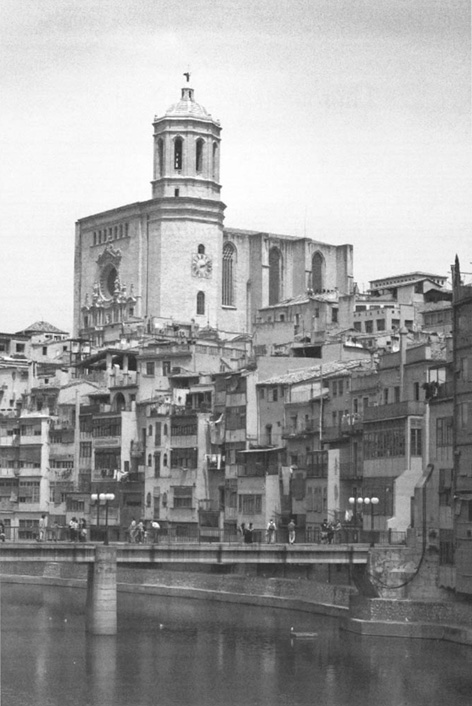
Catalans counterpose the terra de pas to more fundamentalist views of identity, such as that in the Basque Country, often evoked as moulded by remote valleys uncontaminated by outsiders; or of the fierce Castilian tableland in the centre of Spain, freezing in winter and scorched in summer.
There is little genetic nationalist pride in Catalonia; all those who live and work in Catalonia, and ran the slogan of Jordi Pujol, Catalonias first elected post-Franco president, are Catalans. The Catalan language is the distinguishing feature of Catalan nationalism, and anyone who comes and lives here can and should learn the language. Thus the definition of Catalonia as a terra de pas is transferred easily into a complacent modern view of an easy and hospitable people welcoming newcomers into a tolerant, liberal country. The terra de pas also implies that the country is a terra dacolliment, a land of welcome.
The story, of course, is never as simple as peoples views of their best selves. Africans and Asians today, picking fruit in Lleida for two scorched months a year, do not feel welcomed, but exploited. Many of the migrants to Catalonia, driven off the land by famine in other parts of Spain during the twentieth century, did not feel that working for rock-bottom wages in a Catalan factory was much of a welcome. Nevertheless, signalling the strength of Catalan identity, and to the credit of both the migrants and indigenous Catalans, in the 1960s and 1970s they united in a huge movement of unions and residents associations against the dictator Franco. The immigrants recognized the justice of the demand for Catalonias national rights.
There is another side to the terra de pas, chillingly posed by Claudio Magris, writing about Romania: The evil is that of having too much history, being a crossroads, or at least an optional stop on the route of universal history, along which the slaughterhouses work overtime even in the minor centres. This certainly applies to Catalonia, the minor centre squeezed between two major states, France and Spain. The violence of its history can be envisaged dramatically on the great hill on which the cathedral of Catalonias main inland city, Lleida, is built. Around the cathedral still lies the crushed rubble where the old town was destroyed after Spanish conquest in 1714 and the citadel of the occupiers was raised. Then this latter was itself sacked by French invasion in 1810.
Next pageFont size:
Interval:
Bookmark:
Similar books «Catalonia: A Cultural History»
Look at similar books to Catalonia: A Cultural History. We have selected literature similar in name and meaning in the hope of providing readers with more options to find new, interesting, not yet read works.
Discussion, reviews of the book Catalonia: A Cultural History and just readers' own opinions. Leave your comments, write what you think about the work, its meaning or the main characters. Specify what exactly you liked and what you didn't like, and why you think so.

